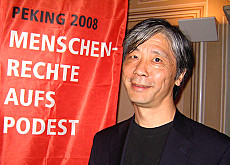
Amnesty Switzerland makes demands on China

The Swiss section of Amnesty International has launched a campaign for better respect for human rights in China, ahead of next year's Olympic Games in Beijing.
At a congress on Saturday in Locarno in southern Switzerland, Amnesty started collecting signatures for a petition to be handed in to the Chinese embassy in Bern six months before the event.
The campaign, which runs under the slogan: “Human Rights on the Podium”, has four demands – the abolition of the death penalty, the abolition of re-education camps, the lifting of internet censorship and a halt to reprisals against defenders of human rights.
“The Chinese committee that bid for the event promised that the Olympic Games in Beijing would contribute to the development of human rights,” campaign coordinator Christine Heller told a news conference in Locarno.
She added that nothing concrete had yet come from the promises made.
According to Amnesty, hundreds of thousands of people are detained in so-called re-education centres.
“Cleaning up”
It says the Chinese authorities have been “cleaning up” Beijing for months. The homeless, beggars and street hawkers are being detained and can face up to three years in re-education camps without being charged.
“Four years ago I still believed that the internet would bring democracy to China,” commented 52-year-old philosophy professor and Chinese government critic Cai Chongguo, who fled the country in 1989 after the Tiananmen Square massacre and now lives in Paris.
However, today he is convinced that the internet has become an instrument that controls the Chinese people. More than 30,000 police monitor the internet around the clock and hundreds of websites are blocked.
The situation as regards press freedom is also bleak. Cai Chongguo said that although foreign journalists were given more liberties from January this year, their Chinese counterparts were still told exactly what they were permitted to write about.
Amnesty also condemned the frequent use of the death penalty. It claims that last year at least 1,010 people were executed, with the true figure substantially higher.
No boycott
Despite the negative human rights picture, Amnesty is not calling for a boycott of next year’s Olympic Games.
“We are convinced that the Olympics in Beijing are a big opportunity to focus attention on human rights,” commented Daniel Bolomey, secretary-general of Amnesty Switzerland.
Cai Chongguo shares his view. “A boycott would only be appropriate if there were a serious incident like a massacre,” he told swissinfo.
The Amnesty petition – with what the organisers hope will be at least 20,000 signatures – will be handed in at the Chinese embassy in Bern on February 8, exactly six months before the opening of the Olympics.
swissinfo, Gerhard Lob in Locarno
The 2008 Olympic Games take place in Beijing from August 8-24. It is the first time they are being held in the People’s Republic.
There are 302 competitions in 28 different sports.
The opening ceremony begins at 8.08pm on 08.08.2008.
Swiss star architects Herzog & de Meuron designed the Olympic stadium in Beijing.
A workforce of about 30,000 is building the Olympic facilities.
The Lausanne-based International Olympic Committee awarded the 2008 Olympic Games to Beijing on July 13, 2001. While the people of the city celebrated in the streets, many human rights organisations, dissidents and Tibetan exiles criticised the decision.
Reactions included “historic wrong decision” and “reward for a corrupt regime”. There was even a parallel drawn with the Olympic Games of 1936 which were misused for Nazi propaganda.
Others insisted that the Games offered an opportunity for democracy in China. The IOC was concerned not to put the focus on the human rights issue in choosing the venue for the 2008 Olympics.

In compliance with the JTI standards
More: SWI swissinfo.ch certified by the Journalism Trust Initiative




























You can find an overview of ongoing debates with our journalists here . Please join us!
If you want to start a conversation about a topic raised in this article or want to report factual errors, email us at english@swissinfo.ch.